Downloads
It is a great pleasure to be able to participate in this conference and in particular with my colleague from the Japanese Ministry of Finance, Takehiko Nakao. We see each other in international meetings all over the world and it is great to welcome him to Australia.
I am going to say a few words on international economic developments. And given the pace of developments, this is a daunting task.
My main observation is that global economic growth has weakened, financial stress has increased and confidence fallen, financial markets will continue to be very volatile, and the outlook for the global economy will remain very uncertain. In addition, to use the language of the forecasters, downside risks will prevail.
These observations are not a very profound given the unfolding saga of economic and political developments in Europe, most of it rather depressing.
But this volatile and uncertain global economic environment, with the threat of a crisis always in the background, will prevail for a considerable period given the magnitude of the economic adjustments that many advanced economies have to embrace in order to stabilize and reduce their debts and get their economies growing again.
We are facing a period where a number of countries will continue to encounter some very tough economic and political choices. The prudent thing is to prepare for a rather rocky international economic picture.
A weakening global outlook
A gauge of the change in sentiment regarding the global outlook can be gained by the change in tone of the communique's coming from international economic meetings.
One reason I say this is because I spend a large amount of my time in communique drafting sessions at international meetings, invariably all night affairs, and it is to be hoped that someone reads the carefully crafted, if often rather tortured, language that comes from these meetings.
At the Seoul G 20 Summit in November 2010, Leaders noted that:
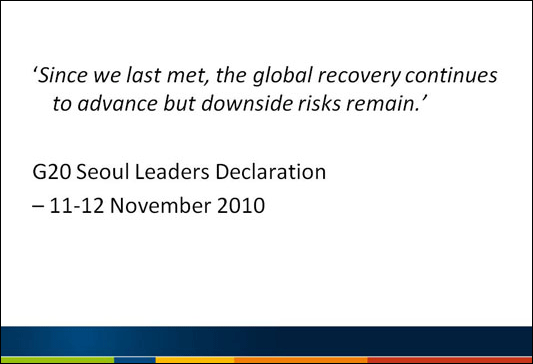
At the G 20 Finance Ministers and Central Bank Governors meeting in February 2011, Ministers noted that:
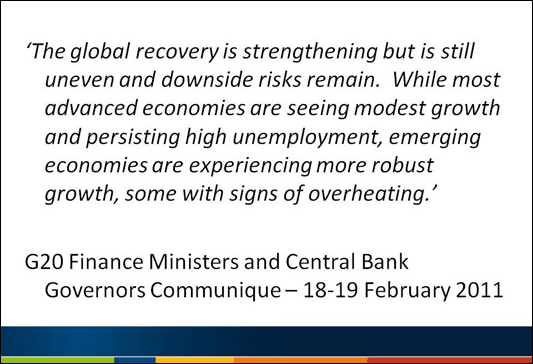
In April 2011, G 20 Finance Ministers met again and the resulting communique stated:
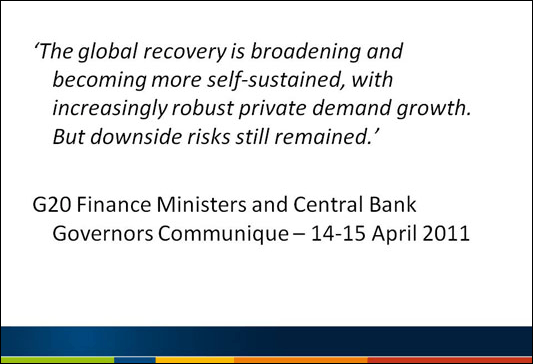
By the time of the Cannes G 20 Summit earlier this month, the message had changed significantly:
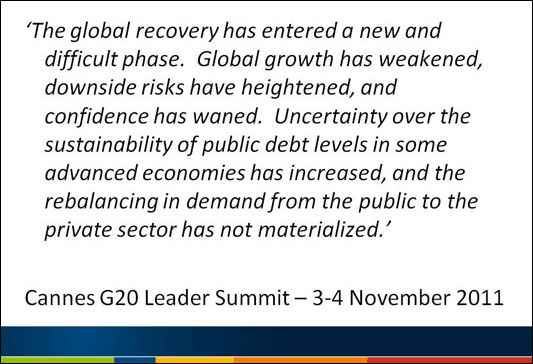
The one constant in those assessments of the state of the global economy was the recognition that, using the forecasters jargon, 'downside risks prevail'. And what we have seen over the course of 2011 is that some of those downside risks have come to fruition and moved into the central case forecast.
As a result, the IMF has revised down its forecasts for the global economy in 2011 and 2012.
Will it continue to chase the global economy down as it revises each forecast? I suspect that this will be the case.
The IMF rapidly chased down its global growth forecasts for 2009, and chased 2010 forecasts up as global growth rebounded on the back of unprecedented monetary and fiscal stimulus.
Chart 1: Global growth moderating
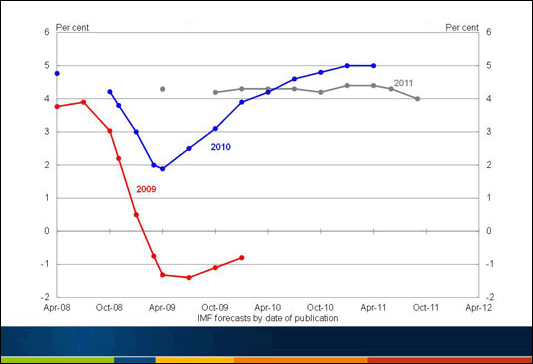
Source: IMF
While 2011 growth forecast have been steadier, the September 2011 World Economic Outlook saw a downward revision of ½ a percentage point for global economic growth in 2012. As I mentioned, I suspect the IMF and other forecasters will end up chasing the forecasts down if the euro area cannot swiftly put in place measures to address its debt crisis.
This is foreshadowed in the recent comments by the IMF Managing Director, Christine Lagarde, when she said on 9 November:
![Slide 6 - 'our sense is that if we do not act boldly and if we do not act together, the economy around the world runs the risk of [a] downward spiral of uncertainty, financial instability and potential collapse of global demand ... we could run the risk of what some commentators are already calling a lost decade.'](/sites/default/files/2019-03/callaghan_japan_conference_6.gif)
I believe the Managing Director was referring to a 'lost decade' for Europe, but the events in Europe will have an impact on the global economy.
By way of an illustration, the IMF staff estimated that in a scenario where growth in the European Union declines by 3.5 per cent relative to baseline for two years, this would lead to a 1 per cent slowdown in the United States over the same period and there could be a similar if not larger decline in the Asia pacific area in the absence of a policy response.
With growth in the United States already anemic, a further downward shock is the last thing it needs.
Forecasts have been revised down
The IMF has revised down growth forecast for the advanced economies, with the exception of Germany, but that may change. The advanced economies are struggling to get a more robust recovery in train and Europe in particular is weakening.
Table 1: Growth forecasts lowered
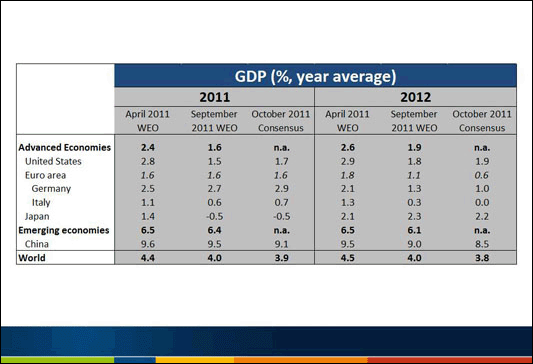
Note: Consensus countries make up around 95 per cent of global GDP on a PPP basis, with the remainder estimated using IMF WEO growth rates. Consensus for India is for fiscal years, which commence 1 April. n.a. = Not available.
Source: IMF World Economic Outlook April 2011 and September 2011, Consensus Economics.
While the emerging economies continue to perform well, they are being affected and their growth forecasts have been revised down, more so in 2012.
Just to put the nature of the recovery in the advanced economies into some perspective, Japan and the euro area have yet to recover to pre-crisis GDP levels. The disasters in Japan earlier in the year have substantially affected the Japanese economy, while sovereign debt, bank funding pressures and deleveraging are having a negative impact on the real economy in the euro area.
Chart 2: Recovery since the crisis
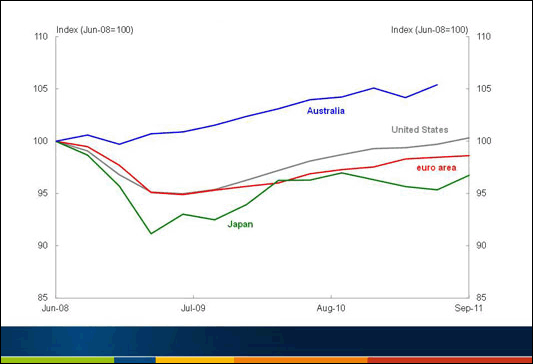
Source: National statistical agencies, Thomson Reuters and Treasury.
US GDP has only recently risen to equal its pre-crisis level, however growth is likely to remain anemic for some time, with the housing and labour markets unlikely to improve in the immediate future.
The weakness in US growth is evident in the ext
remely protracted labour market recovery. Of the 7.5 million jobs lost in the 2007-09 recession, only 1 million have been recovered.
Chart 3: US employment during recessions
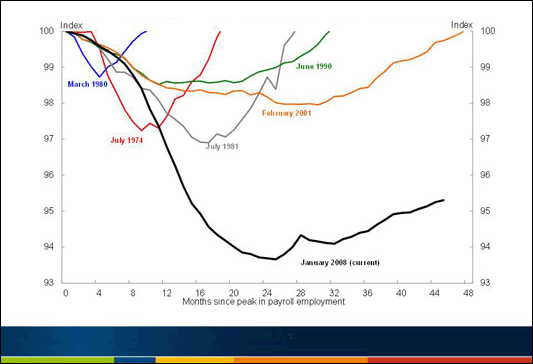
Source: US Bureau of Labor Statistics, Thomson Reuters and Treasury.
Two years into the recovery, the US unemployment rate remains stuck at around 9 per cent, an outcome which is unprecedented in post WWII history. The continued weak labour market is undermining confidence and suppressing consumption. It also raises the risk of high levels of structural unemployment and weaker long-run growth potential, and stokes protectionist pressures.
In addition, the ongoing political debate in the US raises the prospect of a sharp detraction to growth from fiscal policy if compromises cannot be quickly reached.
As noted, the bright spot in the global economy has remained the emerging economies, particularly China and India. They are not immune to deterioration in economic and financial conditions in the advanced economies, but they do have considerable policy flexibility to respond.
A particular issue to watch is the impact of deleveraging by European banks in Asia and also the access to US dollar liquidity that is crucial to keep the wheels of trade turning among the regions inter-linked economies. European banks have claims on Asia of $US 1.9 trillion.
In 2010, developing countries contributed around two thirds of global growth. Their contribution in 2011 and 2012 will be higher. While much of this growth came from large dynamic emerging markets, many other developing countries have improved their growth performance and possess the potential to achieve stronger growth.
For example, the sub Saharan African economies had been growing at an average rate of around 3.5 per cent per year at the turn of the century but have averaged around 6 per cent per year in the five years prior to the crisis and have continued to grow strongly since the crisis. Many African economies may be on the verge of economic take-off.
Some lessons from the Euro zone crisis
At the recent APEC Finance ministers Meeting, the Treasurer referred to some lessons from the euro crisis. These included:
- First, the importance of policy credibility. I will come back to this point.
- Second, the two way relationship between sovereign risk and financial risk, as banks in some countries hold large amounts of government bonds. If the sustainability of those bonds comes into question, so does the entire banking system. The lesson is the importance of ensuring banks are well capitalized and well regulated.
- Europe should have moved long before now in repairing its banking system by undertaking realistic stress tests. It now faces the problem that if the banks seek to improve their capital position by deleveraging rather than raising new capital, credit will be further constrained in an already weak economy.
- Third, events can unfold very quickly and catch people by surprise.
- As noted in the various quotes from recent communiques, it is common to say that 'downside risks prevail'. Those risks may have been identified for a considerable period, but when the market moves, it can move very quickly and financial turbulence and uncertainty can quickly spread. The lesson is that countries should not waste time in implementing needed reforms and addressing those 'downside risks'.
- Finally, given the vulnerabilities and uncertainties in the global economy, along with the speed with which events can unfold, it is important that there be credible official financing available from all sources - but particularly the IMF. The world needs an IMF with appropriate instruments and appropriately resourced.
The Importance of policy credibility
Back to the issue of policy credibility.
There has been a sharp rise in European sovereign yield spreads. For many years, spreads on European sovereign debt were low and largely uniform. Sovereign debts were regarded as a risk free asset. But the rise in spreads over the past year or so reflects markets concern over the 'riskiness' of the debt issued by certain countries. All sovereign debts are no longer considered to be risk free assets.
Chart 4: European sovereign yields spreads
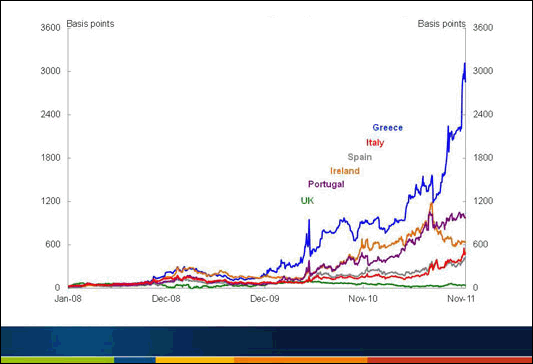
Source: Thomson Reuters.
The debt challenge confronting Greece is well known. Its public debt is around 170 per cent of GDP ; the economy has been declining for three years; part of the Euro zone bailout package involves a 50 per cent haircut on private bond holders; and the political instability raises concerns whether there will be a government capable of implementing needed reforms. The fact that the yield spread on Greek paper has risen dramatically is not surprising.
But if the concern of markets was primarily over the size of a country's fiscal deficit and debt stock, then it is not obvious, for example, why the United Kingdom, with a deficit of nearly 8.5 per cent of GDP in 2011 and gross public debt of 80 per cent is considered significantly less risky than Spain, with a deficit in 2011 of just over 6 per cent and gross public debt equal to around 67 per cent.
Similar comparisons could be made with other countries.
There are a number of factors influencing the markets assessment of the riskiness of a sovereign.
In the case of the UK, compared with countries in the Euro zone, it has the advantage of having its own currency, which means it can devalue to boost growth, and ultimately the sustainability of a country's sovereign debts comes down to its capacity to grow and service the debt. Again, in contrast to Euro zone countries, the UK has its own central bank. It is also implementing a comprehensive plan to lower its deficit and stabalise its public debt. Its policy stance is credible in the eyes of the markets.
Ultimately, the rise in spreads reflects growing concerns around particular governments' ability to implement the required fiscal adjustments and the measures necessary to restore growth. The policy credibility of some governments is being questioned.
This loss of credibility can reflect the magnitude of the task-such as the size of sovereign debt and the extent of fiscal consolidation required; it can reflect the limitations the country faces, such as being in a currency union and not being able to devalue to boost growth when economic activity is low and unemployment high; and it can reflect domestic political factors, such as the inability to form a stable government or the inability to pass required legislation because of political deadlock.
All these factors are at play in parts of Europe.
The lesson for the rest of the world is the importance of maintaining policy credibility. In particular, the importance of having credible medium term fiscal consolidation plans and the importance of pushing ahead with reforms to boost growth.
As we have seen in Europe, once policy credibility is lost, the market will require some harsh measures in terms of fiscal adjustment and pro-growth reforms in order to regain confidence and to be able to re-enter the market at acceptable interest rates.
Moreover, in the case of Italy, what starts as a liquidity issue can quickly become a solvency issue. No country with a debt to GDP ratio of 121 per cent of GDP will be able to sustain funding costs of 7 per cent plus when potential growth is around 0.5 per cent.
In terms of lessons from Europe, it is worthwhile highlighting the following comment from the IMF:
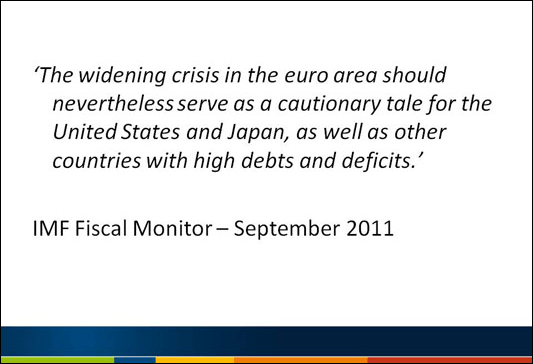
The US has many advantages over countries in Europe, it has its own currency and its own monetary policy. But as we saw with the debate over the increase in the debt ceiling, markets are concerned that it may be in a position of political grid-lock. It is in this context the results of the so called super committee are of a particular concern. Additional, appropriately timed, fiscal savings are particularly important. At a time of uncertainty, decisive policy action is required.
Also important are credible actions by Japan to stabalise then reduce its high debt to GDP. At the moment, markets are treating Japanese Government bonds as a low-risk asset, and yields have fallen to very low levels. But as the IMF has warned, it is not wise to be complacent.
One reason I suggested that the international economic environment will remain volatile and uncertain for some time is because of the magnitude of the adjustment task facing some major economies.
- To achieve fiscal sustainability, these economies need to urgently establish then run substantial average primary surpluses for over a 10 year period. This will prove to be an exceedingly difficult challenge. There are few examples of countries running a primary budget surplus for over a decade or more. It will be a challenging period.
Conclusion
In summary, the global international environment is likely to be rocky for some time to come. Many advanced economies facing some daunting adjustment challenges, if they are to get their debt on a sustainable footing and restore growth. Some tough decisions will be required, politically unpopular decisions. It will not be smooth sailing. And they need to get cracking, for as we have seen, things can change very quickly.